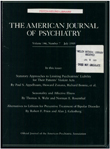Medicine court: Rogers in practice
Abstract
The authors conducted a prospective study of the impact of the Rogers decision involving patients' right to refuse treatment during the first year (1983-1984) of its implementation in the Massachusetts facility for the criminally insane. They learned that of the 98 cases submitted to the probate court, only 39 were heard. The court found that 35 (90%) of the 39 patients whose cases were heard lacked competence to make treatment decisions. Hearings occurred 2-7 months after petitions were signed by treating physicians. In arriving at the decisions the court appeared to rely more on reports of violent incidents than on evidence of mental illness or testimony about competence.
Access content
To read the fulltext, please use one of the options below to sign in or purchase access.- Personal login
- Institutional Login
- Sign in via OpenAthens
- Register for access
-
Please login/register if you wish to pair your device and check access availability.
Not a subscriber?
PsychiatryOnline subscription options offer access to the DSM-5 library, books, journals, CME, and patient resources. This all-in-one virtual library provides psychiatrists and mental health professionals with key resources for diagnosis, treatment, research, and professional development.
Need more help? PsychiatryOnline Customer Service may be reached by emailing [email protected] or by calling 800-368-5777 (in the U.S.) or 703-907-7322 (outside the U.S.).



